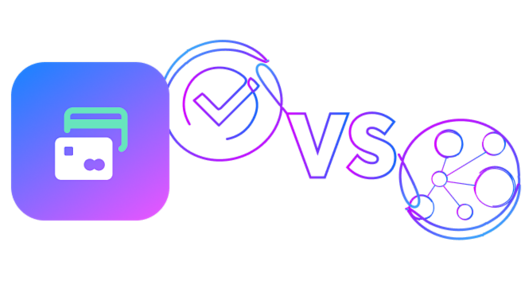In today's fast-moving digital payments world, data security and transaction success are more important than ever. As businesses scale, understanding the difference between PCI-compliant tokens and network tokens becomes critical for protecting sensitive cardholder data, optimizing payment performance, and reducing fraud.
But what exactly separates these two forms of payment tokenization? While both are designed to secure card data, PCI tokens and network tokens serve different purposes, come from different sources, and offer distinct benefits. Whether you're a fintech innovator, an e-commerce platform, or a payments engineer, knowing how each token type works and when to use them can make or break your customer experience and compliance posture.
In this article, we'll break down:
- What PCI-compliant tokens are
- What network tokens are
- How they differ in security, use cases, and issuer involvement
- Which token type is best for your business
Let's dive into the world of tokenization and find out how to make your payments safer and smarter.


What are PCI-compliant tokens?
PCI-compliant tokens are surrogate values that replace sensitive cardholder data, such as the Primary Account Number (PAN), to help businesses reduce their PCI DSS (Payment Card Industry Data Security Standard) compliance scope. These tokens are generated by a tokenization system. Typically, these tokenization systems are provided by a secure payment processor or token vault, like VGS, and are used to safely store or transmit payment information without exposing the actual card data.
These tokens are primarily used to reduce security risks.
- Issued by a third-party token provider or payment processor
- Stored and managed within the merchant's systems or a secure vault
- Typically static for a given customer or card (unless configured otherwise)
- Require vault access for detokenization
- Securely storing cards on file for recurring billing or one-click checkout
- Minimizing PCI DSS audit requirements
- Supporting backend systems with masked card data for analytics or customer service
PCI tokens are excellent for reducing liability, protecting sensitive data, and keeping systems secure without needing to process raw card data.

What are network tokens?
Network tokens are a set of randomized code that act as a substitute for a credit card's primary account number (PAN). Network tokens allow merchants to securely process payments without storing sensitive card details, significantly reducing the risk of fraud and data breaches while increasing token interoperability among PSPs. These tokens are issued and managed by the major card networks themselves, such as Visa, Mastercard, American Express, and Discover.
Network tokens are designed for multi-channel payments, from in-app purchases to digital wallets, and are automatically updated when a customer's card is reissued or expires, reducing transaction failures due to outdated credentials.
- Provisioned and managed by the card networks
- Used across multiple merchants and payment environments
- Automatically updated when a card changes
- Strong fraud prevention with device/domain binding
- Eligible for lower interchange fees in some cases
- Mobile wallets like Apple Pay, Google Pay
- Card-on-file payments for e-commerce platforms
- Reducing false declines and improving transaction success, as well as customer experience
Network tokens are powerful tools for businesses looking to increase payment security and conversion rates while reducing payment friction.
How Do network tokens and PCI-Compliant tokens differ?
While both network tokens and PCI tokens help secure payment data, they serve different roles and offer distinct benefits. Here's a breakdown of the major differences:
-
Security architecture
- PCI-Compliant tokens: Created by a payment processor, gateway, or independent token service provider to tokenize cardholder data for storage. The PAN is stored in a secure token vault, and the token is typically static (used consistently for the same customer/merchant).
- Network tokens: Issued by the network and often dynamic, they include additional security features like device and merchant domain binding, which makes them significantly harder to exploit.
-
Use cases
PCI tokens are ideal for:
- Merchants needing to store cards for subscriptions, recurring payments, or re-use
- Reducing PCI DSS compliance scope by avoiding storing raw PANs
Network tokens are better suited for:
- Digital wallets (Apple Pay, Google Pay)
- In-app or e-commerce checkouts
- Businesses looking to reduce false declines and boost authorization rates
-
Issuer & network Involvement
PCI tokens
- Created independently by merchants or processors; no direct issuer or network involvement.
Network tokens
- Fully integrated with the issuer and card network, enabling updates when cards are reissued and supporting fraud mitigation through issuer authentication.
What are the benefits of network tokens and PCI-Compliant tokens?
There are many benefits to both, so let's break each down.
Benefits of network tokens
Network tokens are issued by card networks (Visa, Mastercard, AMEX, and Discover) and offer payment optimization, security enhancements, and operational efficiency far beyond traditional PCI tokenization.
-
Improved authorization rates
- Network tokens are tied to active, validated cards
- Card issuers often trust network tokens more, which can lead to higher approval rates and fewer false declines.
-
Auto-updates for reissued cards
- When a customer's card expires or is reissued, the network token automatically updates, and there is no need to ask the customer for new details.
- Reduces customer churn and payment interruptions.
-
Stronger fraud protection
- Network tokens are device-bound and domain-specific.
- Network tokens utilize cryptographic keys, dynamic CVV equivalents, and issuer-managed rules, making them far more resistant to fraud.
-
Interoperability across platforms
- Can be used across mobile wallets, e-commerce sites, and in-app purchases.
- Compatible with Apple Pay, Google Pay, Samsung Pay, and other tokenized environments.
-
Lower interchange fees (in some cases)
- Some issuers and networks offer preferential rates for network tokenized transactions due to their reduced fraud risk.
-
Compliance benefits
- Helps reduce PCI DSS scope since the PAN is not stored or transmitted.
- Still requires some PCI compliance, but less intensive compared to raw PAN handling.
Benefits of PCI-Compliant tokens
PCI-compliant tokens are issued by tokenization providers or processors and are ideal for security and compliance-driven use cases.
-
Reduced PCI DSS scope
- Replaces PANs with surrogate values, minimizing exposure and simplifying compliance.
- Can store tokens instead of card data, drastically reducing audit requirements.
-
Merchant-controlled tokenization
- PCI tokens are merchant-specific,, giving more control over how tokens are used, stored, and organized.
- Great for recurring billing, subscriptions, or internal systems integrations.
-
Supports complex business logic
- Easy to implement for custom workflows such as vaulting, orchestration, retry logic, or multi-processor routing.
- Typically integrates well with back-office tools and analytics.
-
Vendor flexibility
- You can choose a token provider that best matches your infrastructure needs—whether it's a gateway, processor, or third-party vault.
Which token type is best for your business?
The ideal token strategy depends on your business model, risk profile, and customer experience goals.
- Need to store cards for recurring billing or subscriptions
- Want to reduce PCI DSS scope and avoid storing raw card data
- Have existing systems built around static tokens
- Operate in e-commerce, mobile apps, or digital wallets
- Want to maximize authorization rates and reduce failed payments
- Need support for card lifecycle management and auto-updates
BUT the best practice? Use both.

Many modern businesses now combine both token types: using PCI-compliant tokens for internal storage and orchestration, and network tokens for actual transaction processing. This hybrid approach gives you the best of:
- Security: By using both token forms, you protect data at rest (with PCI tokens) and in motion (with network tokens), creating an end-to-end secure architecture.
- Compliance: Together, they enable secure, compliant operations while maintaining compatibility with wallets, issuers, acquirers, and multiple processors.
- Improved payment performance: Network tokens are provisioned by card networks and agnostic to the payment service providers, so there is no risk of token non-compatibility amongst providers, leading to improved performance. Network tokens are also automatically updated by the card networks, allowing uninterrupted payment flows. Having both token types makes your payment system more resilient, reduces downtime, and improves retry success for edge cases.
It's a synergistic solution and adopting both future-proofs your payments infrastructure while giving you a competitive edge.


How do I get both PCI-compliant and Network Tokens?
VGS. Our best-in-class data tokenization enables businesses to securely protect any sensitive data element with our extensible API. Offload the risk and costs of storing sensitive payments and identity data with VGS Tokenization.
Learn More



